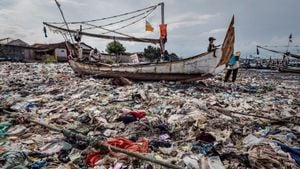On February 23, 2025, Germany conducted its fourth snap election since the end of World War II, resulting in significant political shifts. Citizens cast their votes to select the 630 members of the 21st Bundestag, with the conservative alliance of the Christian Democratic Union (CDU) and the Christian Social Union (CSU) standing out as the largest party, led by chancellor candidate Friedrich Merz. Polling results indicated the CDU/CSU secured about 28.5% of the vote, which isn't enough for outright control, positioning them for coalition negotiations with other parties, particularly the Social Democrats (SPD) and potentially the Greens.
The election was deemed pivotal not only for Germany but for the broader European political climate, as it occurred against the backdrop of rising nationalism and far-right sentiments. Most notable was the performance of the far-right Alternative for Germany (AfD), which surged to approximately 20.5% of the vote, effectively doubling its representation from the last federal election. The AfD's rise is not merely numerical but signifies growing support for its often controversial stances, particularly around immigration and national identity.
High voter turnout of 84%—the highest in 30 years—showcased the electorate's engagement with the democratic process, especially following the coalition government’s collapse last November. The urgency of forming a new government has never been more pronounced. With the SPD falling to its lowest vote share since World War II at 16.4% and the Green Party trailing at 12%, many voters have expressed frustration with the existing leadership.
Friedrich Merz, whose CDU/CSU received about 29% of the vote, must navigate delicate waters as the party attempts to form coalitions. While there are discussions of partnering with the SPD and potentially the Greens, the left-leaning parties have firmly rejected aligning with the AfD, emphasizing the so-called "firewall" against far-right collaboration. Some political analysts suggest Merz may need to lean heavily on the SPD to achieve coalition stability and govern effectively.
"Victory for our democratic values", declared Friedrich Merz, highlighting the election's significance amid concerns over rising extremism, referenced consistently by several commentators. "The AfD's doubling of their vote is concerning for our democracy," remarked political experts involved with the SPD, emphasizing fears surrounding the far-right's growing legitimacy.
The AfD's recent gains should not be taken lightly. While the party officially positions itself as advocating for the interests of German nationals, it has attracted attention for its inflammatory rhetoric on immigration. The party's leaders like Alice Weidel have been celebrated by right-wing figures internationally, including endorsements from previous U.S. administrations. Observers note this growing network of far-right alliances, which poses challenges to Germany's democratic institutions.
Highlights from the election also pointed to widespread discontent with the SPD government’s handling of pressing issues like immigration and national security. Many voters felt their concerns were ignored, reflecting broader trends seen across Europe where traditional political parties struggle to address the anxieties of their electorates. The SPD's focus was seen as misaligned with voter priorities, which shifted significantly as voters increasingly prioritized domestic security and social stability.
The political future remains uncertain as coalition talks are expected to take weeks or even months, complicate by the necessity of aligning multiple party interests. Voter analytics indicate significant public concern over climate policy, migration, and economic revitalization which necessitate immediate government attention.
Friedrich Merz and potential coalition partners must find common ground on climate targets, energy reforms, and economic stability to gain full public confidence. There is significant pressure on any incoming administration to act decisively, especially as Germany's commitments to European Union climate goals hang precariously amid domestic negotiations.
Relevant negotiations on energy policy could dictate Germany's environmental strategies moving forward. CDU's willingness to negotiate with SPD and the Greens might lead to compromises on differing approaches toward renewable energy resources, thereby allowing for potential advancements in Germany's climate policy, contingent upon the final coalition structure formed.
The incoming government will carry the weight of addressing public expectations from the climate crisis, with previous clear commitments potentially facing new, contrasting claims from the CDU/CSU’s support base.
Looking toward the future, the 2025 snap elections have set the stage for serious debates around national security, economic policy, and immigration. These conversations will likely define Germany's political agenda for years to come as it navigates the shifting electoral tides dominated by rising populist sentiments.
The federal parliament must reconvene no later than March 24, 2025, ensuring swift action and leadership continuity to tackle the pressing needs of the German public. Until then, the outgoing coalition remains to fulfill its responsibilities, bridging the gap toward the formation of the new government.



